| Article ID | Journal | Published Year | Pages | File Type |
|---|---|---|---|---|
| 4033659 | Vision Research | 2015 | 7 Pages |
•Dynamic faces produce composite effects.•The magnitude of the composite effect is similar for static and dynamic faces.•Holistic face processing plays a role in ecologically valid conditions.
Holistic processing is considered one of the hallmarks of face recognition. Recent studies using the composite task claim to show a lack of holistic processing for dynamic faces, however they only presented moving faces in the learning phase and tested with static composite images. So while previous research has addressed the question of whether moving faces influence the processing of subsequently viewed static faces, the question of whether moving faces are processed holistically remains unanswered. We address that question here. In our study participants learned faces in motion and were tested on moving composite faces, or learned static faces and were tested on static composite faces. We found a clear composite effect for both upright static and dynamic faces, with no significant difference in the magnitude of those effects. Further, there was no evidence of composite or motion effects in inverted conditions, ruling out low level or other motion signal properties as explanations of performance in upright faces. Together, these results show that upright moving faces are processed holistically, in a similar manner to static faces, extending decades of research with static faces and confirming the importance of holistic processing to familiar face recognition.
